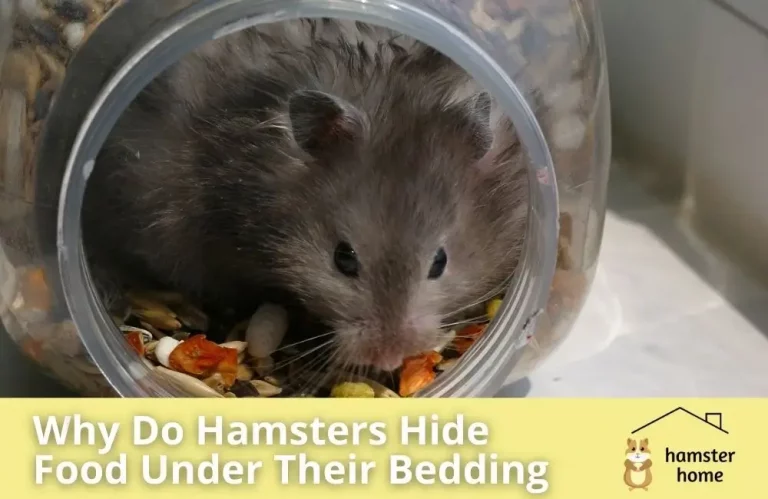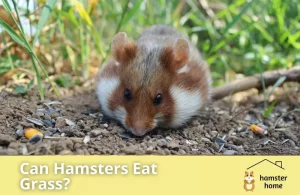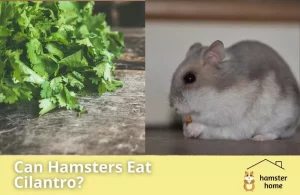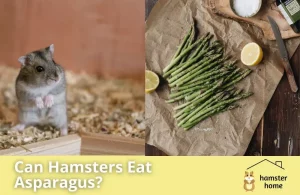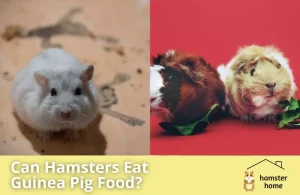Owning a hamster for the first time is an adventurous experience. As a hamster’s owner, you get to learn new things every single day. One of the strangest things that confuse every first-time hamster’s owner is their habit of hiding food under their bedding.
Are you also looking for answers to this question? Well, you are not the only hamster owner who wonders this. To clear the confusion, we have done all the homework for you.
Buckle up your seat belts for the enjoyable hamster-related knowledge ride.
History Of Hamsters:
Humans started adopting hamsters as pets nearly a century ago. Still, most of the hamsters on the planet live in the wild.
By nature, they are prey animals and have to be very cautious to survive. These tiny creatures live to eat, and food also puts them in danger more than anything else.
When in the wild, hamsters have to take every step very carefully, literally. It’s always a matter of life and death for them.
The whole process makes food more important.
There are plenty of instincts in your hamster that makes him store food under their bedding. All of these instincts are related to the evolution of the hamsters.
Following are the reasons why hamsters hide food under their bedding:
To Protect Themselves
Imagine a zombie outbreak near you, and the food supply is also limited. What will you do in this case? You will try to store as much food as possible to avoid going outside.
The same is the case when it comes to hamsters in the wild. The world outside their bedding is full of predators; hence it is crucial to minimize outdoor trips. The habit of hiding food in their bedding comes naturally as a survival instinct.
If they have food in their bedding, they don’t have to go outside frequently in order to address their hunger.
Even hamsters which are now kept as pet animals, share the same instinct with their ancestors. This habit has proven to be so helpful that it became an instinct through evolution. Most of the newly born hamsters may display this instinct later in their lives.
To Face Food Shortage
Under natural circumstances, sometimes hamsters face severe food shortages due to the weather, season, or acts of God. To be prepared for such situations beforehand, hamsters store food under their bedding.
Who do they hide their food specifically under the bedding? It is to ensure that it catches minimum attention. This trait of these tiny creatures has helped them survive the harshest of the environments.
In places where winters are harsh, the food supply gets disturbed. For such instances, the survival of the hamster depends upon its success in storing food. Metabolism of these pocket-sized pets is quite fast; hence they also need a lot to keep dealing with hunger problems.
To Remove Traces
Studies have shown that hamsters play an actual 007 move by hiding the food to remove traces of their presence from the scene. For a wild hamster, life is a 24/7 hide and seek game where he is usually hiding from the predators for his life.
Hamsters are smart enough to acknowledge that the predators can trace them through the remains of their food. It is why, instead of leaving the food untreated, they hid it under their bedding.
Scientifically speaking, this is evolution at its finest. If hamsters don’t hide their food, predators can easily trace them by smelling the food. When hamsters bury this food in their bedding, many new smells add up and form a mixture. This is how a hamster dodges death almost every day.
Fear of falling is a human’s natural instinct. Babies are born with this fear without experiencing falling actually. Just like that, hamster pups are born with the fear of predators even if you keep them in a safe facility.
Hence, storing food in their bedding start as a natural urge to survive. When hamsters grow up, they are not that much scared anymore, and that is when they start hiding food as a habit.
To Save It For Themselves
For hamsters, nothing is more than food, not even their own life. Almost every wild hamster proves this statement. These hamsters go out every day with a world full of potential predators just to get food.
Simply to make sure that no one steals their hard-earned food, they store it under their bedding. Sometimes, hamsters are not being intelligent or protective; they are just being selfish.
You can’t blame the hamsters for this because being selfish is the only way of surviving in the wild.
This is what confuses first-time hamster owners the most. Despite an endless supply of food, why do hamsters hide food? The answer is pretty simple “Old habits do not change.”
Sometimes, in the early stage of life, hamsters do not realize that they are in a safe environment. Their minds are hard-wired to store as much food as possible before the winter. When they grow up, these primal instincts have turned into habits that stay with them for life.
Is Eating Stored Food Good For Hamster’s Health?
No matter how hard you try, if your hamster hides food, they will probably keep doing this for their whole life. This behavior is actually an indication of their excellent health. It is why you shouldn’t be thinking about ways to get of this habit of your hamster.
The main question that arises here is, “Is it healthy for them to eat this food?” Well, the answer to this question totally depends upon the type of food you provide them.
For instance, we all know that most hamsters love eating fresh fruits and veggies. The only problem with providing fresh plants to your hamster is the decaying process associated with them.
When you provide fresh plants to your hamster, they will never eat all of it at once. After eating some of it at that time, they store the rest near their bed area or in the bedding. We all know, when plants are kept without refrigerators, they start decaying quickly.
Bacteria and microbes start growing in them, and they become highly toxic. When your hamster consumes this contaminated food, they are at the risk of catching some severe diseases. On account of this, it is recommended for you to avoid giving fresh plants to your hamster.
Which Foods Should You Give To Your Hamster?
When the popularity of hamsters as pocket-sized pets rose, scientists started researching the ideal food for them. Fortunately, you can easily find some dry hamster foods that are full of nutrition.
Pet store’s dry hamster food is also recommended because they remain healthy to eat for a long time. Hence, even if your hamster hides food under their bedding, it will be safe to consume. It is something that you can’t guarantee for fresh plants.
Hence, if you care about your hamster’s health, then avoid fresh plants and feed them dry pet food.
Conclusion
Hamsters are one of the cutest pets that you can ever have. Owning a hamster is much different from owning a cat or a dog. There are some strange elements of hamsters’ behavior that you won’t find in any other pet’s behavior.
On top of this list sits their habit of hiding food under their bedding. There could be multiple reasons behind this venture. Sometimes, this could be merely an act of selfishness. Motives could also include avoiding the attention of predators, facing a shortage of food, and more.
FAQs
The minds of first-time hamster owners are filled with lots of random questions. Following are some most commonly asked questions regarding hamsters’ food hiding habits:
Have you seen those small cheeks filled with loads of food? Ever wondered why do hamsters do this? Storing food in your bedding could be a daunting task if you don’t have anything to carry that food.
Thanks to evolution, hamsters’ cheeks have developed to carry reasonable amounts of eatables at once. In the wild, this helps them save the energy required to go back and forth to the food source.
Storing food near the sleeping area is another element of hamsters’ behavior that confuses many hamster owners. The answer to this question also lies in the hamster’s history and natural life in the wild.
If hamsters store food away from their sleeping area, they will be risking their lives. To avoid getting spotted, they keep food near the place where they sleep.
Sorry to break the bubble for you; hamsters believe that they have stumbled upon a natural food source themselves instead of you providing food for them. It is the main reason why they cover their food bowls.
They believe that this food source is only known to them, and they want to keep things that way. In simple words, these furballs wish to keep all of their food just for themselves, which is kinda cute.

